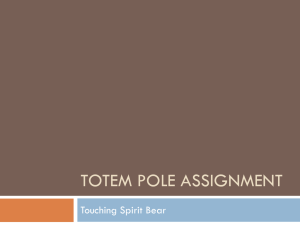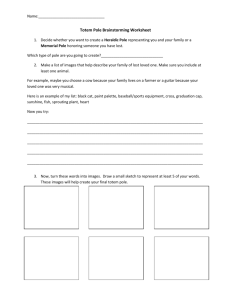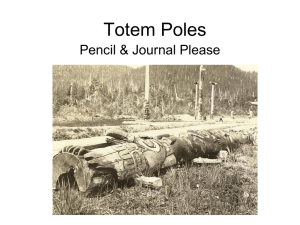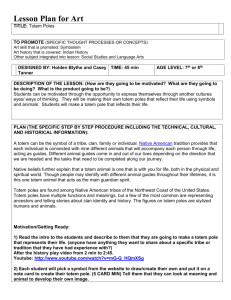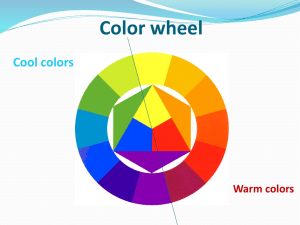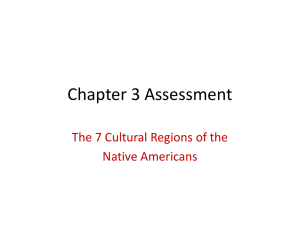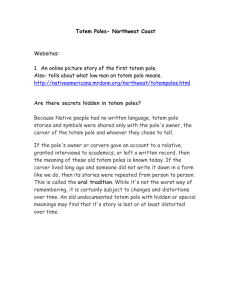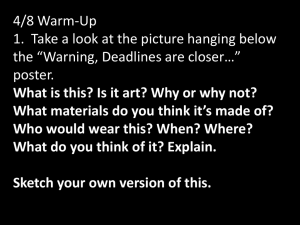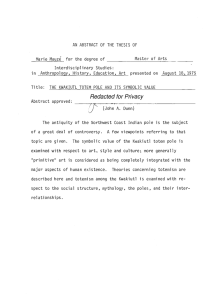Totem Poles
advertisement
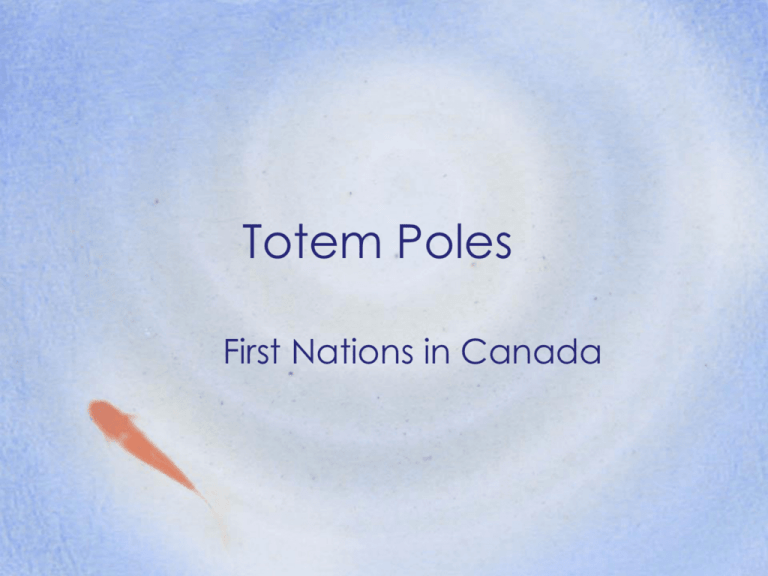
Totem Poles First Nations in Canada • Please copy your own notes from the following slides. • These notes are to help you with your next summative assignment History • A totem pole tells a real life or mythical story. • The history of the Canadian totem pole goes back for generations. • Totems have multiple Northwest Native figures carved on tall, western cedar poles. • Each figure represents a meaning, a Northwest Native family's crest or even a coat of arms recording their family history. • Some tribes made totem poles as giant human welcome figures. • For example, the Coast Salish people in southern BC and western Washington state carved large human figures on poles to represent ancestors and spirit helpers. Salish Totem pole in British Columbia, Canada • Memorial poles were often placed in front of houses in honour of deceased chiefs or on top of the remains of important individuals. • The first Northwest Coast Native tribes who made totems as part of West Coast art were the Haida, Tlingit and Tsinshian in BC and southeast Alaska in the early 1880’s. • Totem pole use spread to other tribes in the Northwest region over the years. Potlatch Ceremony • Performed whenever new totem poles were raised. • Potlatches were made illegal in Canada during the late 1800’s and most Northwest native tribes stopped making large totem poles • This anti-potlatch law was dropped in 1951 and the Native people resumed carving totem poles. • Many totem poles have been specially commissioned and placed in both public locations as well as in private art collections around the world. • The art of pole carving is now practised by artists from other Native groups Meaning and Purpose of the Totem Pole • Meanings of the designs are as varied as the cultures which produce them • All represent pictography, or writing with pictures. • Totem poles may be carved to recount familiar legends, clan lineages, or notable events, to illustrate stories, to commemorate historic persons and/or to represent shamanic powers • "Some of the figures on the poles constitute symbolic reminders of quarrels, murders, debts, and other unpleasant occurrences about which the Natives prefer to remain silent... The most widely known tales...are familiar to almost every native of the area...” • Totem poles were never objects of worship • The association with "idol worship" was an idea from local Christian missionaries. • The same assumption was made by certain early European explorers • Later explorers found that totem poles were never treated reverently; they seemed only occasionally to generate allusions or illustrate stories; and were usually left to rot in place when people abandoned a village. • Another Salish Totem Construction and Maintenance • The raising of a totem pole is almost never done using modern methods • The traditional ceremony and process that is still followed by the artists uses a great wooden scaffold and hundreds of strong men haul the pole upright into its footing while others steady the pole from side ropes and brace it with cross beams. Haida people raising a totem pole • Once the pole is standing, a potlatch is typically held where the carver is formally paid and other traditional activities are conducted. • The carver performs a celebratory dance next to the pole while wielding the tools used to carve it. • The base of the pole is burnt before standing to provide a sort of rot resistance, and the fire is made with chips carved from the pole. Rules and Customs • Each culture has complex rules and customs regarding the designs represented on poles. • The designs themselves are considered the property of a particular clan or family group. • Pictures, paintings, and other copies of the designs may be an infringement of possessory rights of a certain family or cultural group. • There are no set guidelines indicating the order of the images on the pole: the most revered of gods appear on the tops of many poles as well as on the bottoms. The World's Largest Totem Pole • Has been claimed by several towns along the coast: * Alert Bay, British Columbia — 173 feet (56.4 m), Kwakiutl * Vancouver, British Columbia (Maritime Museum) — 100 feet (30.5 m), Kwakiutl, * Victoria, British Columbia (Beacon Hill Park) — 127.5 feet (38.9 m), Kwakiutl * Kalama, Washington — 140 feet (42.6 m), carved by Chief Lalooska * Kake, Alaska — 137.5 feet (41.9 m), Tlingit There are disputes over which is genuinely the tallest, depending on construction from a single log or the carver. Competition for making the tallest pole is still prevalent, although it is becoming more difficult to find trees of such heights. Haida Poles Thunder Park What Animal are You? • As we go through the list of animals, write down any that you feel pertain to you. Bear: is known for its period of hibernation. Bear can help us with the ability to turn inward to access our strength and honour your nature cycles. He teaches us when it is time to act and when it is time to be still. Beaver: Has an amazing ability to build and create. Beavers can help you solve problems by creating solid solutions Buffalo/Bison: brings abundance and healing. Cougar: A symbol of power. Cougar teaches you to balance your own. Cougar responds to any challenge with swiftness. Coyote Is known as the trickster. He calls on us to look truthfully at our selves and our behaviour. Crow: a messenger, keeper of sacred law who sees with a unified eye (non-duality) Deer: alert and a symbol of sensitivity and kindness. Dolphin: messengers between water and sky. They are playful and intelligent. They bring the message of harmony and balance. Eagle: A symbol of freedom and perspective. As a representation of great spirit eagle carries our prayers to the sky. He teaches us to fly. Elk: teaches about stamina, the importance of pacing yourself enabling you to successfully complete your chosen task Fox: cunning and clever he moves with the utmost discretion. Fox teaches us to slow down and observe. Frog: assists with the cleansing of our emotions. With the element of water frog shows us how to start afresh. Hawk: symbol of observation and awareness. Horse: represents strength and freedom. Horse teaches us how to use our power gracefully. Mole: explores below the surface by digging a little deeper therefore he helps us with our subconscious minds. Mole will help you explore the hidden parts of yourself. Moose: teaches us to be proud of our accomplishments. Otter: the master at enjoying life. Otter is playful and chatty. The otter reminds us that play is a important aspect to enjoying our lives fully. Owl: represents wisdom. Owl has amazing vision bringing the gift of insight. Rabbit: A symbol of fertility. Rabbit help us reveal our hidden talents. Raven: the messenger from spirit world. He represents mystery develop your intuition. Snake: Symbolises transformation and the shedding of ones skin. Spider: Shows us the connection of all life through the power of her web. Squirrel: Is prepared for anything that life may present. They are extremely adaptable and teach us to trust that with preparation our own life will be simple and safe. Turtle: Is protected by her shell. She represents mother earth to some tribes. Whale: Are the record keepers of the ocean. They bring us the gift of telepathy and teach us the value of sound. Wolf: Is a great teacher. He helps you find the answers within yourself. Associated with the moon wolf will help you develop your intuition. Natural Elements • Sun • Moon • Stars • Wind • Rain • Snow
